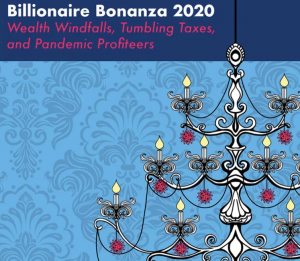
We’re missing billions in taxes each year. That’s partly why our roads and transit systems are falling apart. (Mural by graffiti artist Alec Monopoly / Photo by aisletwentytwo | Flickr CC 2.0)
This report comes from the Institute for Policy Studies.
In early April this year, as 22 million Americans lost their jobs and the U.S. employment rate approached 15 percent, the combined wealth of America’s billionaires had increased from March 18 by $282 billion — nearly a 10 percent increase. That’s among the findings in a new report published today by the Institute for Policy Studies, “Billionaire Bonanza 2020: Wealth Windfalls, Tumbling Taxes, and Pandemic Profiteers.” Download the report HERE.
“This is the tale of two pandemics, with very unequal sacrifice,” said Chuck Collins, a co-author of the report. “While some are seeing their wealth increase by billions, others are suffering. We are not all in the same boat as long as billionaires are cruising in their yachts, and most Americans are simply trying to keep their heads above water.”
The report studied both the recent impact of the pandemic as well as long-term trends in wealth accumulation by the U.S. billionaire class. It found that between 1990 and 2020, U.S. billionaire wealth soared 1,130 percent in 2020 dollars, an increase more than 200 times greater than the 5.37 percent growth of U.S. median wealth over this same period.
While much pandemic media attention has focused on the loss of wealth in the stock market decline and business disruption, the IPS report found that many billionaires are well-insulated from such losses. In fact, after a brief decline, the combined wealth of U.S. billionaires has surpassed their 2019 levels. Between January 1, 2020 and April 10, 2020, 34 of the nation’s wealthiest 170 billionaires have seen their wealth increase by tens of millions of dollars.
Eight of these billionaires – the “pandemic profiteers” – have seen their net worth surge by over $1 billion each. They are: Jeff Bezos (Amazon), MacKenzie Bezos (Amazon), Eric Yuan (Zoom), Steve Ballmer (Microsoft), John Albert Sobrato (Silicon Valley real estate), Elon Musk (Tesla and SpaceX), Joshua Harris (Apollo Global Management), and Rocco Commisso (Mediacom).
Jeff Bezos’s wealth surge is unprecedented in modern financial history. As of April 15, his fortune had increased by an estimated $25 billion since January 1, 2020. This is larger than the Gross Domestic Product of Honduras, which was $23.9 billion in 2018.
“We shouldn’t be distracted and bamboozled by billionaire charity,” said Collins. “As a class, they have used their considerable political clout over the decades to reduce their tax obligations, shifting expenses onto the rest of us.” According to the IPS study, between 1980 and 2018, the tax obligations of America’s billionaires, measured as a percentage of their wealth, decreased 79 percent.
Other findings in the report:
-
- The billionaire share of America’s increased wealth has risen throughout the past four decades. Between 2006 and 2018, nearly 7 percent of the real increase in America’s total wealth went to the country’s 400 wealthiest households.
Billionaire wealth rebounded quickly after the 2008 financial crisis, taking less than 30 months to attain its pre-meltdown levels. Between 2010 and 2020, U.S. billionaire wealth increased 80.6 percent in 2020 dollars, more than five times the median wealth increase of 15.1 percent for U.S. households over the 2010 to 2016 years, based on most recent available data.
The report also makes recommendations to prevent the pandemic from further concentrating billionaire wealth and power. These include:
-
- Establish a Pandemic Profiteering Oversight Committee that goes beyond oversight of stimulus funds.
Discourage wealth hiding through passage of the Corporate Transparency Act.
Levy an emergency 10 percent Millionaire Income Surtax.
Unleash a Charity Stimulus to mandate payouts of donor-advised funds and emergency 10 percent payout for private foundations for three years.
Make the federal estate tax more progressive and institute a wealth tax.
Shut down the global hidden wealth system.
The report defines wealth as net worth, or assets (what you own) minus liabilities (what you owe). Distinct from income, which represents the flow of wages, investment income, and entitlement payments, wealth, in contrast, provides a long-term indicator of financial well-being.
According to the report, the accelerating concentration of our nation’s wealth has enabled a small sliver of the population to enjoy a wildly disproportionate say over how our society operates.
If expanding billionaire wealth lifted all people, the size of billionaire fortunes might be something to celebrate. But the report shows that the number of households with zero or negative wealth is increasing. A high percentage of U.S. households are living on the edge, paycheck to paycheck. The current pandemic has exposed our central economic and social reality: Extreme wealth inequality is America’s pre-existing condition.
The report says that this pre-existing condition has left our political system too feeble to function democratically. Many billionaires are investing their fortunes in ways that expand their own wealth and power. The politicians they back are cutting their taxes and blocking public investments like early childhood education and low-cost college that expand opportunity for everyone else. At its core, the combination of consolidating wealth and power hurts our economy and our democracy.
The full report, “Billionaire Bonanza 2020: Wealth Windfalls, Tumbling Taxes, and Pandemic Profiteers” may be downloaded from The Institute for Policy Studies (IPS) website. The IPS is a multi-issue research center that has conducted path-breaking research on inequality for more than 20 years. The IPS Program on Inequality and the Inequality.org website provides research, advocacy and policy development on issues related to economic inequality.
The views expressed in this post are the author’s alone, and presented here to offer a variety of perspectives to our readers. This work is licensed under a Creative Commons Attribution-Share Alike 3.0 License.




